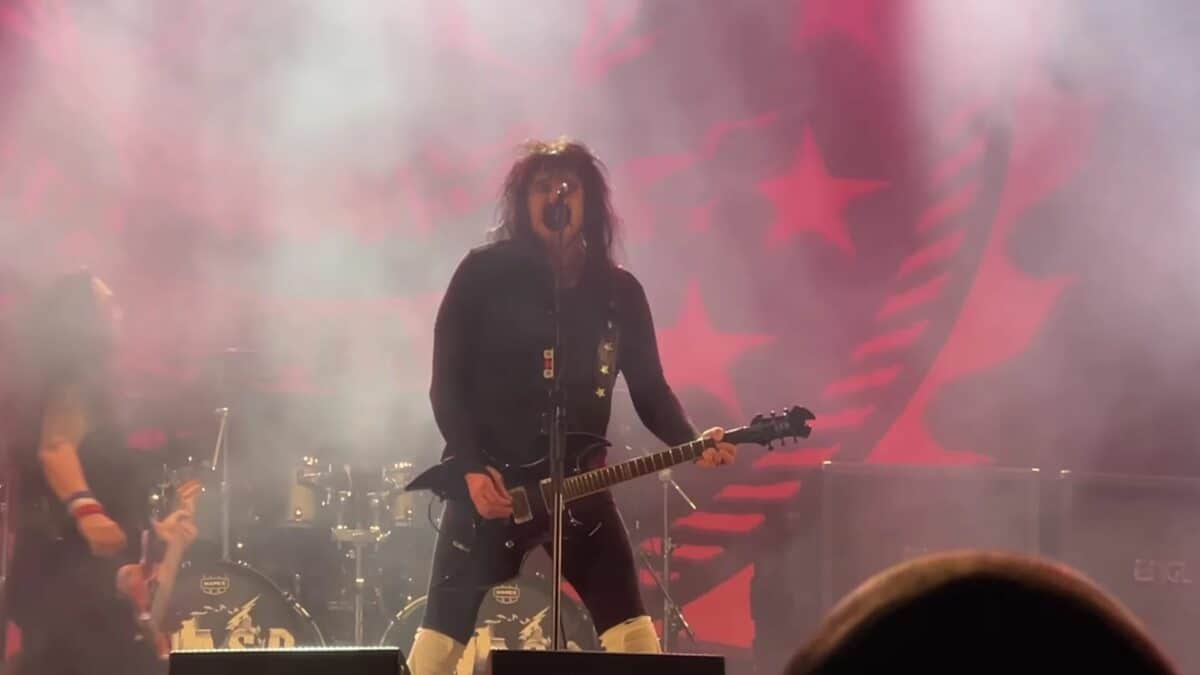
In a recent interview with Guitar World magazine, W.A.S.P. frontman Blackie Lawless discussed the continued use of backing tracks in the band’s live performances.
“It’s because we don’t have the personnel,” he said. “We were doing stuff from The Crimson Idol, and there’s a 100-piece orchestra going on there; taking that on tour would be impossible financially.
“The first time we did Crimson Idol live, we did it without the orchestration. Did it sound good? Yeah. But when we did it with the orchestration, I stood in the middle of the room in rehearsal, and I swear to you, it was like a religious experience. I thought to myself, ‘If I’m a fan, this is what I want to hear.’ So that’s the reason I do it. It enhances the experience. I want people to hear the records the way they were intended to be heard, not like a facsimile version.”
When the interviewer mentioned that “people assumed it was [Blackie‘s] voice and the guitars being replicated with tracks,” Lawless responded: “All somebody has to do is record it and listen to all the mistakes. Then they would understand. You can try as hard as you can, man, but you’re gonna screw up. Rock ‘n’ roll was never meant to be perfect. And even if you try, it ain’t gonna be.”
In June, Blackie was interviewed by Ultimate Classic Rock about the perception among some fans that W.A.S.P. concerts aren’t truly live, to which he responded: “Well, if they’re crazy enough to believe it, that’s their business. But if they genuinely feel like that, then don’t go.
“Listen, God blessed me with this foghorn in my throat. Like anybody who’s got one, we like showing ’em off — and I’m no different.
He continued: “I’m sorry if this sounds arrogant, but there will be times where I’m up there and I hear what’s coming out of me, when I’m sustaining a note or something. I’m thinking to myself, ‘Wow, that’s pretty cool.’ I’m not sure most people would have the opportunity to experience something like that in their lives. So from my perspective, I’m pretty appreciative of it. As I said, when you’ve got this thing that really not a lot of people can do, you like to show it. [Laughs]
“Let me add one more thing. I grew up listening to [THE WHO‘s] Live At Leeds. Even though I didn’t realize it at the time, there are overdubs on it. But it’s pretty raw. It sounds like it was done by a three-piece band. For the most part, it’s pretty realistic. But they don’t do it like that anymore. What they were doing was giving you a reflection of 1970. They were giving you a snapshot of that timeframe. And that’s what bands did.
“But when technology changed and we had the ability to make it sound bigger and better, who’s not going to do that? I mean, you can do the Live At Leeds version. We used to. Was it good? It was okay for what it was. But you know, if I’m going to see a show — and this is my personal opinion — I want that thing to sound like the record. I don’t care what QUEEN says, or any of these other bands, ‘Oh, we’re doing that live.’ No, you don’t have 20 guys behind that stage singing. [Laughs] You just don’t. They’re all getting help out there. The bottom line is to give the audience a good show. Who cares how it gets there?”
“There’s the argument that some of these girl singers out here now, they don’t sing a note and they probably don’t,” he added. “Hey, listen, if I’m going to go see Yngwie [Malmsteen], I want to see Yngwie play. But there are some guys in some rock bands that if they didn’t play and it was recorded, it wouldn’t bother me one iota. Because I’m not going there to see that. I would be going to see the songs. But if somebody’s got a dangerous instrument that they’re really good at and can do something that few people can do? Yeah, I wanna hear ’em do it. So in my opinion, I’m giving them that, but I’m also giving them the best of both worlds.”
Reeder, the visionary behind Metal Addicts, has transformed his lifelong passion for metal into a thriving online community for metal aficionados. As a fervent devotee of black metal, Reeder is captivated by its dark, atmospheric, and often unorthodox soundscapes.